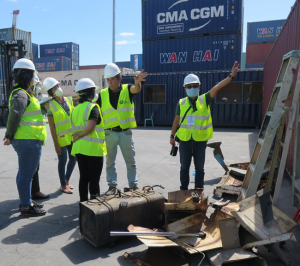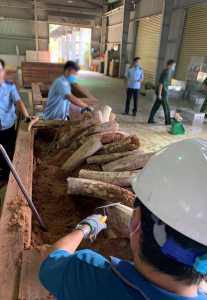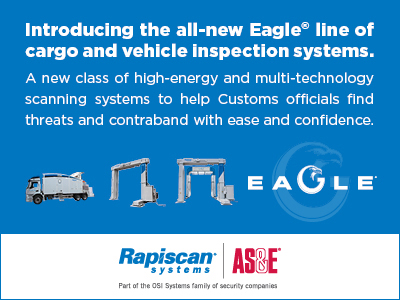UNODC-WCO Container Control Programme: 15 years old and still going strong
22 October 2019
By Norbert Steilen, CCP Coordinator, WCOIdentifying shipments containing prohibited or smuggled goods is somewhat like searching for the proverbial “needle in a haystack” for Customs officers. Let’s keep this image in mind: modern container ships are like massive “haystacks,” each carrying up to 20,000 containers. It’s the same with planes: while the volume of goods they carry is less impressive, it is still substantial, and the rise of e-commerce has generated fleets of all-cargo aircraft carrying thousands of individual parcels across the globe.
Aware of these challenges, the WCO and the United Nations Office on Drugs and Crime (UNODC) agreed 15 years ago, in 2004, to launch a joint programme to deal with illicit goods being transported in sea containers. This saw the birth of the Container Control Programme (CCP). The programme aims at establishing and training dedicated Port Control Units (PCUs) and Air Cargo Control Units (ACCUs) at key seaports and airports, and to improve their risk analysis capacity, enabling them to efficiently control trade operations with minimum disruption.
PCUs and ACCUs are “joint units” gathering Customs officers and other national law enforcement personnel, such as the police, the drug enforcement agency, the environmental agency, and the air security agency. The composition of these units is a national decision. If the legal tasks of participating authorities are not merged, the fact that they are gathered into a single unit and follow the same training enables an inclusive analysis of risk, which increases the detection of illicit goods, be it drugs, strategic goods, high excise products, protected timber or endangered wildlife, and even stolen motor vehicles.
Training delivery and gender mainstreaming
At the outset, the two Organizations adopted a staged approach in the way they delivered the programme. Activities are organized over a period of at least three years in stages, referred to as the “crawl-walk-run” approach. While the WCO focuses on delivering specialized training to the units’ members, the UNODC manages other aspects that include ensuring funding, political support and preparing the pre-deployment phase as well as maintaining close contacts with participating countries.

Full-time experienced trainers work for the programme. Training starts with two basic courses to ensure members of the newly formed teams have the necessary theoretical and practical knowledge, and then continues with regular specialized courses on precursor chemicals, strategic trade goods, endangered species, evidence handling, and other topics specific to the challenges in a particular country.
Safety and Security are also high on the CCP’s agenda. Cooperation with the International Civil Aviation Organization (ICAO) enabled air cargo security to be embedded into the training curricula and ACCU staff to be sensitized on the critical elements to watch out for, in order to ensure the integrity of air transport.
All training courses address the risks associated with “insider threats” as well as the infiltration of port and airport infrastructure by well-organized criminal syndicates. To combat these issues of crucial importance, the units are always strongly encouraged to hold regular meetings with the private sector, in particular, terminal freight forwarders and operators as well as shipping line representatives.
Study visits to other ports or airports are also organized to familiarize the newly trained officers with the working methodologies applied elsewhere, and to enable them to establish personal contacts with their fellow colleagues abroad. Each CCP training event is evaluated by the participants, which enables the trainers to measure their performance and, if necessary, adapt the methodology. Support is also provided through mentoring: each CCP trainer acts as a mentor, spending a few days every two to three months with each PCU or ACCU to evaluate their working methods, provide advice, retrain them, if necessary, and document what is happening with the unit for report-back to the programme management team.
Moreover, a national Steering Committee in charge of monitoring their work meets regularly, and external assessments are conducted at midterm level. If the number of cases managed or initiated by the units is an indicator of their performance, it is not the only one. Also taken into account are the modus operandi put in place, the level of exchange of information, and the motivation and skills of the team.
Given the high focus now placed on gender mainstreaming, an internationally embraced strategy to ensure gender equality, the “CCP Women’s Network” was launched, in 2015, to promote the role of women in the CCP and, more generally, in law enforcement activities. To boost this decision, gender sensitization training modules have been integrated into the training portfolio.
Instruments and tools

In terms of tools, the “ContainerComm” and “AirCargoComm” communication platforms provided by the WCO enable PCUs and ACCUs to exchange information on seizures made, on suspicious shipments or on any analysis undertaken so that they can update their national risk profiles on concealments, modus operandi, and smuggling routes.
Currently, ports and airports in more than 100 countries, including small islands as well as countries participating in the programme as mentors or partners, have access to the WCO’s communication platforms, creating a large community of professionals. Some units also have access to the WCO Cargo Targeting System (CTS), an IT system that enables users to capture advance electronic cargo manifest information, and to perform risk assessment, profiling, and targeting.
All these elements, such as the use of pre-arrival data for risk management purposes, regular meetings with private sector entities, Customs-to-Customs cooperation, are embedded in WCO instruments, in particular the Risk Management Compendium and the SAFE Framework of Standards to Secure and Facilitate Global Trade.
Shortfalls and challenges
Of course, the implementation of a complex programme such as the CCP does not go without shortfalls and challenges. These range from poor support from management and even isolation of the PCUs and ACCUs, frequent rotation of the units’ staff, to long-winded decision-making processes, and a lack of adequate legislation. Staff attached to PCUs and ACCUs have also been threatened by criminal syndicates.
However, the WCO and the UNODC believe in the value of the programme, and try to work with each participating country in a flexible manner, adapting to local situations and needs, and keeping the momentum going. This is evidenced by the recent focus on illicit trade in timber in several Latin American and Southeast Asian countries, and on illicit shipments of waste and abandoned containers.
Successes and thanks
Today, 53 countries participate in the programme with more than 110 units established. The figures that follow demonstrate the successes of the CCP. Different PCUs and ACCUs have identified and detained over:
- 319 tons of cocaine;
- 5 tons of heroin;
- 71 tons of cannabis;
- 7 million tons of precursor chemicals;
- 903 consignments of counterfeit goods;
- 9 billion cigarettes;
- 98 shipments of strategic trade goods;
- 183 shipments of illegal items infringing environment related regulations.
The CCP is now 15 years old, and is one of the WCO’s longest-running programmes. Such longevity would not be possible without the generous financial support of the international donor community, and the in-kind contributions of numerous WCO Members who have provided training experts and made facilities available.
The WCO and the UNODC Secretariats will continue striving to keep the programme dynamic and responsive to both the needs of its participating members and society, and would like to thank the men and women working in or with the programme, who day-after-day demonstrate their commitment to safeguarding the nations of the world.
More information
CCP Annual Report

